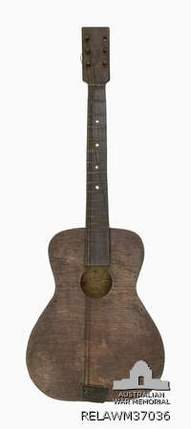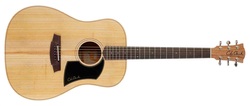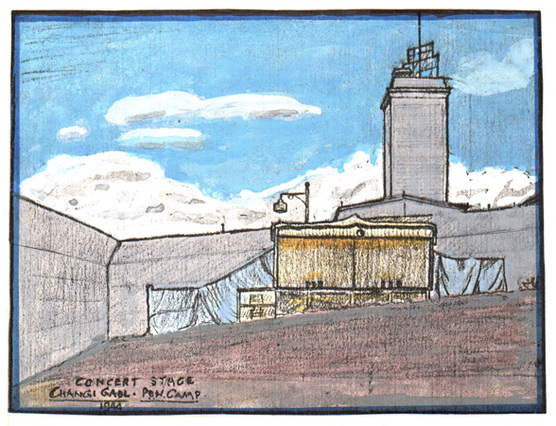On My Soapbox
So... are you famous?

Changi Guitar
(at AWM)
Not that long ago, I had a kid come up to me whilst I was performing at a shopping centre and asked me "are you famous?" For many children, the act of singing and performing is synonymous with aspiring to be a star. There are numerous television shows which promote this theme and of course the music industry thrives on this concept - "You can be a star!"
I've known some people to be unsupportive or ambivalent of my efforts in music, because they think that my motivation is based upon the "dominant" view of what it is to be a musician. The "dominant" or "conventional" view for most, is that for a musician to be successful, you need to follow examples like that of Michael Jackson, U2 or the Beatles.
U2 are great, virtually the whole world knows of Michael Jackson and the Beatles certainly made serious impacts on the modern music scene, but to see music only in the light of these examples, is to put limits on the true potential of music. Believe it or not, the current dominant view of music is a relatively short-lived one and is in essence, an "industry" based view.
Now there is nothing wrong about making money out of music, in fact it is a good thing to get paid for what you love to do, but unfortunately this commercialism aspect of music has now dominated the populist view. It is very easy to dismiss this, but prior to the advent of recording technologies, radio, TV and now the internet, music was always live and had very high participation levels throughout entire communities. Once upon a time music was not an industry!
The advent of mass media, global communications and the quick ability for middle-men to link supply and demand in this field, has reduced much of music appreciation to the levels of mere consumerism. We don't appreciate music any more, we consume it. It is a commodity just like groceries, hamburgers, mobile phones or designer jeans. Musicians are promoted like brand names, and success or otherwise is judged in the main, by ones image and ability to sell, not musical ability.
Now I don't pretend that we should rewind the clock a few hundred years, as that will never happen; but I would like to recall a time when music was something more. Music has never, and will never be confined to the hands of a "star" on a stage, it is everywhere: a lullaby that a mother sings to her baby; a sea shanty that men whistle; or a nursery rhyme sung by children in a playground. Though uncommon now, music was something that friends and family would join in around the piano, after dinner for entertainment - before there was TV! Music was something that communities would freely share together during ceremonies and important gatherings. Once upon a time music was art and a part of life. It wasn't something that was traded or kept only for a select few. Music was part of the fabric of daily living, like cooking, working and talking.
Whilst there have been many who have influenced me, my biggest influence and greatest supporter was my mother who unfortunately passed away in 2011, due to cancer. I had the privilege of caring for her whilst she was ill, and during this time I often sang to her. I don't care how corny it may sound for a son to do this for his mother, because for my mum, it was important and it made a real difference. It took her only a few months from the time of diagnosis to her death and it was a terrible, heart-breaking experience. But out of this, I will never forget how much she appreciated music, it was something that she could still take in and enjoy, long after her ability to walk had gone. For mum, music wasn't just some trivial, decorative feature that you consume only in your spare time - music was as important as the medication she was taking. It was a way for her to feel alive and transcend her circumstance.
The ability of music to communicate and even transcend confusion, pain and grief is amazing, and I've personally seen this with autistic children, the aged and the sick. It crosses language barriers and cultural divides. During World War II in the notorious Changi Prison - Singapore, prisoners would hold a concert every two weeks. The committee who organised this, started work only two days after they first arrived at Selarang Barracks. The Japanese even permitted a permanent work party of 30 men to arrange these concerts. Despite the severe deprivations of prison life, the concert eventually gathered to itself items such as backdrops, lighting, various instruments including several guitars, a piano and even a drum kit. The picture of the top of this page is a guitar made by an unknown Australian Prisoner of War (PoW) carved with names of members of the 10th Australia General Hospital. It is now held custodially by the Australian War Museum in Canberra. It is a testament to how important music was to these prisoners. I find it absolutely remarkable that in a time where the basics for life were scarce, a PoW managed to make such an instrument!
[Note: Image reproduced with kind permission from the Australian War Memorial (AWM).]
I'm not saying we shouldn't pay artists or that they shouldn't promote themselves or that they can't be famous. On the contrary, artists should be able to promote themselves and make a living out of music. Musicians like Joan Baez, John Denver and Tommy Emmanuel should be famous! I certainly will be doing what I can to promote my music and to chase paid gigs! What I am saying is that music is much more than just buying a song from the internet, putting it on our personal playlist and playing it at our whim, or paying $200 for a ticket to a huge sell-out concert. You don't need to be "discovered" to be a successful musician. Of course it helps to be able to pay your bills from your performances, but success should be judged more by how effectively music flows from you to others, regardless of whether or not you have a global audience.
To illustrate my point, consider a lullaby sung by a mother to her child. Why are lullabys sung? Is it to be famous? Is it to win a prize? Is it to support the singer's self-esteem and prove something to the world? None of these apply. The mother sings because this type of music offers comfort to her child. It communicates something that conventional language is powerless to convey. A baby has no concept of the inter-relationships between nouns, verbs, adjectives or even a full appreciation of facial expressions, because eyesight is still forming at such a young age; yet a baby easily recognises the voice of nurture and comfort.
This is one of the earliest experiences of music (apart from all the aural experiences in the womb!) that a human being can be exposed to. I know that a minority of parents still do this, but for the vast majority, singing to their children is a dead tradition, that went out the door a long, long, time ago. The average child when having to recall an image of music, would probably recall a TV image of a teen-idol pop star, rather than their mother or father singing to them.
The soldier who made that guitar in Changi will likely never get wide public recognition for his efforts. I doubt whether he will receive accolades, standing ovations or music royalties for his performances, but did he make a difference in the lives of those around him? "Too right he did!" During those concerts he and his imprisoned friends laughed, made fun of their guards and made the best of their bad situation. Not only were they entertained, but the Changi Concerts gave them something vital, yet intangible. Music gave the prisoners hope.
Music gave these war prisoners a vision of something positive, even beautiful, that transcended well beyond their current circumstance. This hope slipped past their guards, hurdled over the barbed wire and jungles, and flew over the seas, to the homes and loved ones they dreamed of. Today's disillusioned masses could do well to look at the example of these men and learn how they coped with life, and how to smile, even in times of war and death.
Some food for thought! José
(Melbourne 2012)
I've known some people to be unsupportive or ambivalent of my efforts in music, because they think that my motivation is based upon the "dominant" view of what it is to be a musician. The "dominant" or "conventional" view for most, is that for a musician to be successful, you need to follow examples like that of Michael Jackson, U2 or the Beatles.
U2 are great, virtually the whole world knows of Michael Jackson and the Beatles certainly made serious impacts on the modern music scene, but to see music only in the light of these examples, is to put limits on the true potential of music. Believe it or not, the current dominant view of music is a relatively short-lived one and is in essence, an "industry" based view.
Now there is nothing wrong about making money out of music, in fact it is a good thing to get paid for what you love to do, but unfortunately this commercialism aspect of music has now dominated the populist view. It is very easy to dismiss this, but prior to the advent of recording technologies, radio, TV and now the internet, music was always live and had very high participation levels throughout entire communities. Once upon a time music was not an industry!
The advent of mass media, global communications and the quick ability for middle-men to link supply and demand in this field, has reduced much of music appreciation to the levels of mere consumerism. We don't appreciate music any more, we consume it. It is a commodity just like groceries, hamburgers, mobile phones or designer jeans. Musicians are promoted like brand names, and success or otherwise is judged in the main, by ones image and ability to sell, not musical ability.
Now I don't pretend that we should rewind the clock a few hundred years, as that will never happen; but I would like to recall a time when music was something more. Music has never, and will never be confined to the hands of a "star" on a stage, it is everywhere: a lullaby that a mother sings to her baby; a sea shanty that men whistle; or a nursery rhyme sung by children in a playground. Though uncommon now, music was something that friends and family would join in around the piano, after dinner for entertainment - before there was TV! Music was something that communities would freely share together during ceremonies and important gatherings. Once upon a time music was art and a part of life. It wasn't something that was traded or kept only for a select few. Music was part of the fabric of daily living, like cooking, working and talking.
Whilst there have been many who have influenced me, my biggest influence and greatest supporter was my mother who unfortunately passed away in 2011, due to cancer. I had the privilege of caring for her whilst she was ill, and during this time I often sang to her. I don't care how corny it may sound for a son to do this for his mother, because for my mum, it was important and it made a real difference. It took her only a few months from the time of diagnosis to her death and it was a terrible, heart-breaking experience. But out of this, I will never forget how much she appreciated music, it was something that she could still take in and enjoy, long after her ability to walk had gone. For mum, music wasn't just some trivial, decorative feature that you consume only in your spare time - music was as important as the medication she was taking. It was a way for her to feel alive and transcend her circumstance.
The ability of music to communicate and even transcend confusion, pain and grief is amazing, and I've personally seen this with autistic children, the aged and the sick. It crosses language barriers and cultural divides. During World War II in the notorious Changi Prison - Singapore, prisoners would hold a concert every two weeks. The committee who organised this, started work only two days after they first arrived at Selarang Barracks. The Japanese even permitted a permanent work party of 30 men to arrange these concerts. Despite the severe deprivations of prison life, the concert eventually gathered to itself items such as backdrops, lighting, various instruments including several guitars, a piano and even a drum kit. The picture of the top of this page is a guitar made by an unknown Australian Prisoner of War (PoW) carved with names of members of the 10th Australia General Hospital. It is now held custodially by the Australian War Museum in Canberra. It is a testament to how important music was to these prisoners. I find it absolutely remarkable that in a time where the basics for life were scarce, a PoW managed to make such an instrument!
[Note: Image reproduced with kind permission from the Australian War Memorial (AWM).]
I'm not saying we shouldn't pay artists or that they shouldn't promote themselves or that they can't be famous. On the contrary, artists should be able to promote themselves and make a living out of music. Musicians like Joan Baez, John Denver and Tommy Emmanuel should be famous! I certainly will be doing what I can to promote my music and to chase paid gigs! What I am saying is that music is much more than just buying a song from the internet, putting it on our personal playlist and playing it at our whim, or paying $200 for a ticket to a huge sell-out concert. You don't need to be "discovered" to be a successful musician. Of course it helps to be able to pay your bills from your performances, but success should be judged more by how effectively music flows from you to others, regardless of whether or not you have a global audience.
To illustrate my point, consider a lullaby sung by a mother to her child. Why are lullabys sung? Is it to be famous? Is it to win a prize? Is it to support the singer's self-esteem and prove something to the world? None of these apply. The mother sings because this type of music offers comfort to her child. It communicates something that conventional language is powerless to convey. A baby has no concept of the inter-relationships between nouns, verbs, adjectives or even a full appreciation of facial expressions, because eyesight is still forming at such a young age; yet a baby easily recognises the voice of nurture and comfort.
This is one of the earliest experiences of music (apart from all the aural experiences in the womb!) that a human being can be exposed to. I know that a minority of parents still do this, but for the vast majority, singing to their children is a dead tradition, that went out the door a long, long, time ago. The average child when having to recall an image of music, would probably recall a TV image of a teen-idol pop star, rather than their mother or father singing to them.
The soldier who made that guitar in Changi will likely never get wide public recognition for his efforts. I doubt whether he will receive accolades, standing ovations or music royalties for his performances, but did he make a difference in the lives of those around him? "Too right he did!" During those concerts he and his imprisoned friends laughed, made fun of their guards and made the best of their bad situation. Not only were they entertained, but the Changi Concerts gave them something vital, yet intangible. Music gave the prisoners hope.
Music gave these war prisoners a vision of something positive, even beautiful, that transcended well beyond their current circumstance. This hope slipped past their guards, hurdled over the barbed wire and jungles, and flew over the seas, to the homes and loved ones they dreamed of. Today's disillusioned masses could do well to look at the example of these men and learn how they coped with life, and how to smile, even in times of war and death.
Some food for thought! José
(Melbourne 2012)


